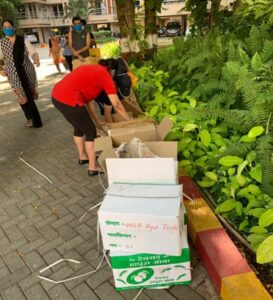Farmers' Markets Go High Tech: How Online Sales Are Saving Indian Farmers.
Marak lives in the town of Meghalaya in Tura, a mountainous place in northeast India whose name translates as “the abode of clouds”. She is among millions of farmers in India – agriculture contributes nearly a seventh of the country's GDP – in despair over the prospect of seeing their produce go bad as the country entered a severe lockdown in the third week of March. According to a report by Credit Suisse , vegetable growers alone lost more than Rs 20,000 crore (2.5 billion lbs).

Now, technology has come to the rescue of some of these farmers, as befits a country that has a large population of tech-savvy entrepreneurs.
“Local wholesalers were offering such low rates and the products were rotting. That's when I got a call from A-Bani suggesting I market my products online,” says Marak.
A-Bani is an app launched a few weeks ago by the non-profit organization Anant Foundation to connect Meghalaya farmers with buyers interested in high-quality organic products such as turmeric, pineapple, jackfruit and cashews.
“I realized I would be gaining 70% more per kilo,” says Marak. Adding pride to profit, this is the first time their produce has been sold outside of Meghalaya – no feat for a frontier state farmer. It helps that several states have relaxed the rules, allowing farmers to sell directly to consumers anywhere in the country.
The app is just one of dozens of virtual markets that have opened up during lockdown as quickly as street markets close. Many of these were community farming initiatives that now use the Internet to connect farmers and consumers.
Dhanunjaya KC discovered one of these when the lockdown sent him back from his engineering college in Bengaluru to his family's two-hectare grape orchard in Gudahalli. A Google search for “How to Sell Farm Products Online in India” brought you to the Twitter account Harvesting Farmer Network (HFN).
“Ruchit Garg, who runs it, posted my details on Twitter. My phone has not stopped ringing since then,” says Dhanunjaya. He and his father hired a truck to go to Bengaluru and deliver cases of grapes to 30 apartment complexes. They made Rs 25 per kg. Middlemen in Gudahalli were offering Rs 8-10 per kilo.
HFN is a virtual network connecting farmers directly with customers across the country that Garg runs from his home in Chandigarh, northern India. India . The founder of an agritech company, Garg stepped in when he saw photos of farmers feeding their broccoli crops to cows because there were no takers. He has now launched a website to take HFN beyond Twitter.
“In two months, we sold 20,000 tonnes of produce – avocados from Nilgiris and papayas from Chattisgarh,” says Garg, whose team helps farmers with packing and delivery.
In Tons Valley, in the mountainous state of Uttarakhand, social entrepreneur Anand Sankar has successfully ordered and paid in advance for the apple orchards that dot the landscape. Sankar ran a social media campaign to sell 250 cases of apples to individuals in Coimbatore, Delhi, Chennai and Bengaluru.
Mango farmers along the Konkan coast of Maharashtra, devastated by the lull in exports, are now receiving a flood of orders from housing societies in Pune and Mumbai, facilitated by startup Gaia Agritech.
The idea of buying fresh produce directly from the producer, usually at a competitive price, appeals to city dwellers. Anamika Bist, who lives in a high-rise building in Bengaluru and runs Village Story, a community farming business, organized an online Lockdown Farmers' Market, publicizing farmers' details on social media. Your WhatsApp has not stopped buzzing for the past two months.
More than 2,300 kilometers away, in the Himalayan city of Pithoragarh, Hemendra Negi, a 31-year-old flower grower, took place on Bist's social media campaign. Within days of contacting her, he had more than 400 inquiries and an order for 30,000 flowers for May delivery, three times the local wholesale market rate.
Negi asked truck drivers hauling vegetables to take his boxes of flowers to relatives in Delhi, who then delivered them across the city.
New digital platforms are gearing up for a longer shelf life. Leather exporter Sunil Gahtori, who has linked a network of 30 farmers with 200 housing societies around Bengaluru through the Taru (Agricultural Resource Utilization Team) initiative and is building an app for this, says it should encourage deep thinking about healthy and organic living.
Food policy analyst Devinder Sharma says macro-level policies are needed to manage volume and sustain agriculture during the pandemic. “Just as people have a family doctor, they should also have a family farmer”, he says.



0 Comments